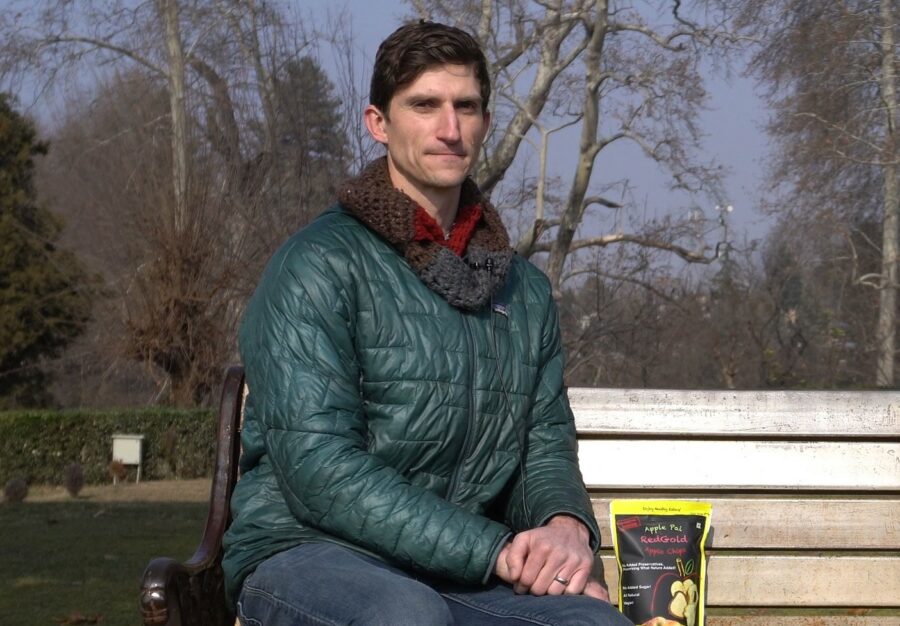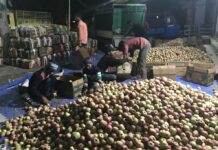Flying around to explore the possibility of setting up a business in the third world, an American agriculture graduate landed in Kashmir, a place he had never heard of. Bowled over by the beauty, climate, culture and resources, he invested first in managing his language barrier and then in a start-up that will help Kashmir revive a lost tradition, Maleeha Sofi and Iqra Akhoon report
Brady Lee, an American national is popular on Kashmir’s social media for his interesting Kashmiri. He is popular as Koshur Angrez, a Kashmiri-speaking foreigner. Now many people know that the xenophile’s Kashmiri is not as impressive as his Kashmir business is.
It is an interesting story. Three years back, Brady was in Srinagar as a tourist. He saw the culture, and the people and studied the economy of the place. During his visit, he came closer to a trader Farooq Ahmad. Seeing Kashmir as India’s main apple basket, he saw potential in manufacturing apple chips. With Farooq as a partner, the company is up and running.
Brady said when he was in High School he developed an interest in entrepreneurship. Although he had a constant push from his father to pursue his studies, he switched his degree several times.
“I was unsure of my career, to be a doctor, a journalist, a psychiatrist or a psychologist,” he said. “Finally I decided that I want to go into agriculture.” He took a degree in agriculture while having some interest in business management and hotel management.
His Kashmir visit, now he reveals, was also part of his efforts to set up his business. “I love travelling and have been to many places, but I had never heard of Kashmir,” he admitted. He had a clear choice – to set up a business at a developing place.
“I felt Kashmir is very beautiful,” he said about his visit when he flew with his wife after proper planning. “The climate of my home and Kashmir are similar.” He found Kashmir hospitable and people-friendly, some even inviting him home for meals.
For Brady and his wife, the only hurdle was the language barrier. To manage this, they went to a tutor for three months and later sought help from two more. “My wife learnt Kashmiri from a female and I learnt from a male,” he said, insisting he has picked up the basics. Even though he is not fluent, he understands and speaks well.
Impressive Host
Farooq had a huge impact on Brady. After they frequently met at home and around, Farooq suggested he study Kashmir properly and explore the possibility of investing here. It was after a lot of interactions, they decided to set up a business. Later, he applied for a business visa. However, the plans froze initially because of August 2019 happening and later of Covid19.

It was only in 2021 when he flew to Srinagar and the spade work for the business started. Brady had already concluded that Kashmir is resource-rich and that agriculture offers huge potential. “If these resources are explored, we can bring the economy in.”
Puzzled why a lot of Kashmiri people from an agriculture background make different career options and leave, Brady said the place has enormous potential. “I believe if people with good ideas and sharp minds invest here, then Kashmir would be a great place and it will develop very quickly.”
Reviving A Tradition
Brady said he decided on apple pie only after studying that Kashmir has a rich tradition of dried apples. Kashmir has historically been into making tscount hatcheh (sun dried apple), a culture that was last popular in Chrar-e-Sharief where the custodians of the shrine would give tangeh hatcheh as tabrouk to devotees.
“Apple chips are slightly different as these are crispy in texture in comparison to sun-dried apples,” Brady said.
Brady and Farooq finally zeroed in on apple chips because it is still unexplored. Fruit juices are around, and have a good market, but chips are rarely seen. There are some dry fruit sellers who sell dried apples and Brady aims to add to the market by producing a quality product. Besides, they decided on apples because their raw material is locally available and a new derivative is added to the economy. “We researched this product to the last detail and when we finally made it, we distributed it among people and took their response,” Farooq said.
Unlike banana chips, which are fried or baked, Brady said, his apple chips are neither baked nor fried. “We dehydrate apples to form chips.”
Instead of sun-drying apples, they use machine dryers. They have special dehydrators which preserve the enzymes and nutrients. Unlike sun-dried chips, which run the risk of germ absorption, machine-dried chips are hygienic. “Our chips have a year-long life span,” Farooq said.
Product In Market
Right now, they are supplying the chips to Delhi and Mumbai only. Once they are on firm footing, they plan to explore global markets. They see a possibility of using the same technology for other fruits as well. Brady said they are not adding any preservatives but they have chips in multiple flavours.
Farooq said their idea will supplement the efforts already the trade is making. While part of the produce goes into juice making, chip-making can consume another part of the produce. “Every time, we may not require rushing the fresh apple to markets, we can retain a bit and make chips and sell them at our ease,” Farooq said.















